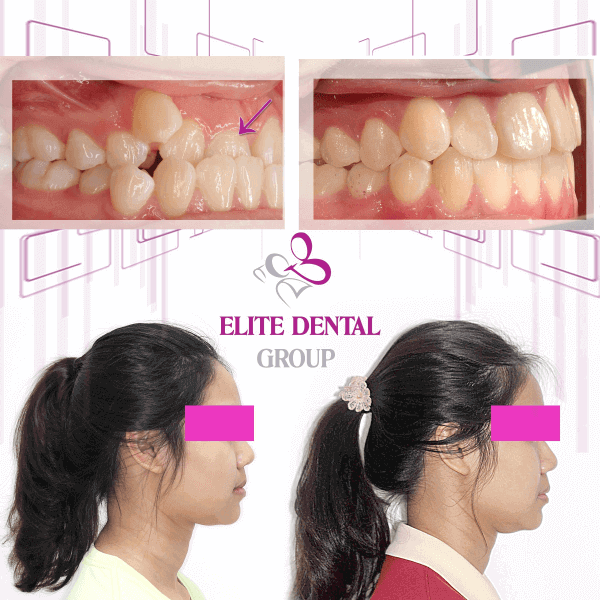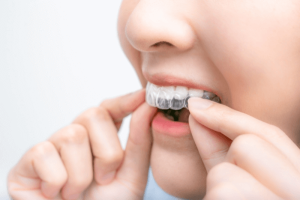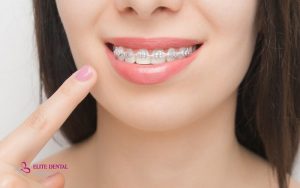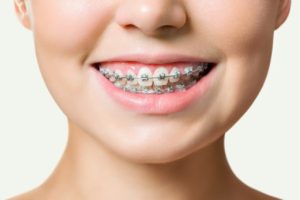Table of content
At Elite Dental, many customers often ask about the differences between ceramic and metal braces and which type is the best choice today. With over a decade of orthodontic expertise, Elite Dental’s experienced doctors are here to provide detailed answers to these questions.
1. Comparing Ceramic and Metal Braces
First, let’s understand what braces are. Braces use brackets and archwires to reposition teeth, correcting misalignments and jaw irregularities. This effectively addresses issues like gaps, overbites, underbites, crooked teeth, and crowding. Braces not only enhance the aesthetics of your smile but also restore proper chewing functionality.
Currently, two popular types of braces are ceramic and metal. Both methods rely on brackets combined with specialized archwires and auxiliaries to exert stable forces, guiding teeth and jaws into their ideal positions. This process corrects misaligned teeth, improves aesthetics, and balances facial harmony.
However, ceramic and metal braces differ in specific features. To make the best choice, it’s essential to understand these differences:
| Comparison Criteria | Metal Braces | Ceramic Braces |
| Criteria for An examination | 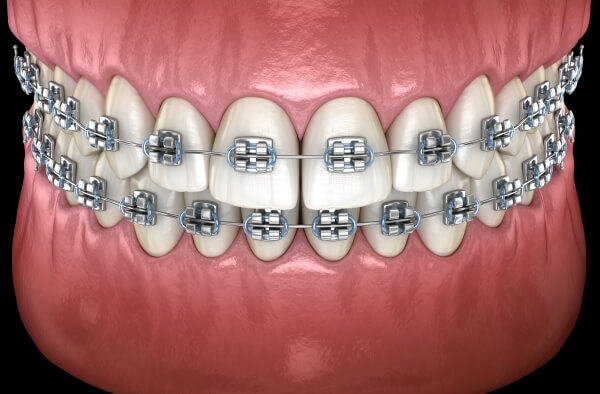 | 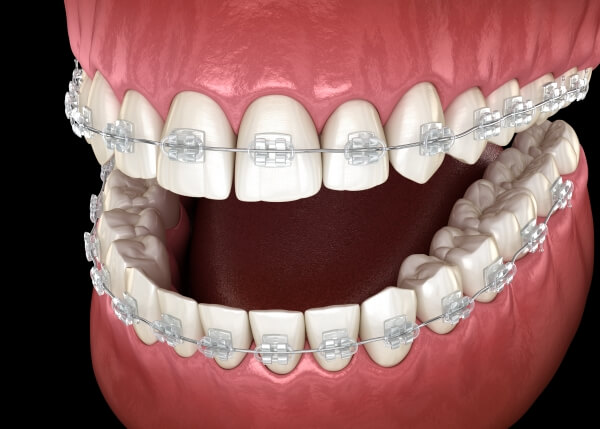 |
| Application Cases | Suitable for cases like: – Deep bite (upper teeth cover ¾ of lower teeth), underbite, crossbite, or open bite. – Misaligned teeth, including crowding, gaps, crookedness, protrusion, or overbite. – Jaw discrepancies, such as a protruding upper jaw, a protruding lower jaw, a narrow upper jaw, or an asymmetrical lower jaw that leans to the left or right, causing facial imbalance or excessive gum exposure when smiing. | Ceramic braces are also applied to similar cases of dental and jaw misalignments as metal braces. However, they are particularly preferred in the following situations:
|
| Material | Metal braces are made of stainless steel, ensuring safety and durability for oral health. | Ceramic braces are crafted from high-quality ceramic material, resistant to acid erosion and capable of withstanding the moist environment of the oral cavity. This material also minimizes the risk of irritation to the body. |
| Aesthetics | Metal braces are more visible on the teeth during eating and talking, offering lower aesthetic appeal. They are easily noticeable, making it clear to others that the wearer is undergoing orthodontic treatment. | Thanks to the tooth-colored ceramic material, ceramic braces provide a high level of aesthetics. They are less noticeable and blend seamlessly with the natural color of teeth, making them hard to detect unless observed up close. |
| Comfort | Metal braces are designed to be compact, reducing the feeling of bulkiness and making daily activities more comfortable. | Ceramic braces are slightly larger and occupy more space in the mouth, which can cause a feeling of bulkiness and discomfort for the wearer. |
| Chewing Function | Metal braces can limit chewing functionality, requiring patients to avoid hard, chewy, or sticky foods to prevent interference with orthodontic results. | The design of ceramic braces makes chewing easier, reducing the adhesion of food to the braces and simplifying oral hygiene. |
| Orthodontic Effectiveness | Metal braces provide high effectiveness in correcting misaligned bites and crooked teeth. | Ceramic braces not only adhere firmly to the teeth and withstand varying levels of force but also facilitate smoother tooth movement, delivering optimal orthodontic results. |
| Adaptability | Metal braces can cause irritation in patients with sensitive oral tissues. During the initial phase of treatment, the sharp edges of metal components may damage the lips, cheeks, or gums. | The smooth and polished surface of ceramic material reduces friction, minimizing soft tissue injuries such as cheek or lip bites. This feature also enhances oral hygiene during the treatment process. |
| Material Durability | The brackets and wires made of metal are highly durable, with minimal risk of cracking or breaking. | Ceramic brackets are more prone to scratching or breaking if subjected to strong impacts or if hard foods are consumed. If breakage occurs, the entire set of brackets may need replacement. |
| Treatment Duration | The treatment time for metal braces typically ranges from 1 to 3 years. In some cases, it may be shortened by 1 to 6 months. | The treatment time for ceramic braces ranges from 1.5 to 3 years, depending on the specific condition of the patient’s teeth. |
| Cost | Metal braces are the most affordable option among all types of braces. | Ceramic braces are more expensive compared to metal braces. |
2. Should You Choose Ceramic or Metal Braces?
The choice between ceramic and metal braces depends on your dental condition, aesthetic needs, and budget. For those with small teeth unsuitable for ceramic brackets, metal braces offer a cost-effective solution. Meanwhile, individuals prioritizing aesthetics or working in roles requiring frequent communication should opt for ceramic braces.
To ensure the best results, consult an orthodontic specialist at a reputable dental center. At Elite Dental, our five key advantages guarantee optimal outcomes:
Modern Orthodontic Techniques
As a pioneer in Invisalign technology since 2013, Elite Dental offers advanced orthodontic solutions, addressing traditional braces’ limitations with shorter treatment times and superior aesthetics.
Expert Doctors
Elite Dental’s orthodontists bring over 10 years of experience in traditional and Invisalign treatments, designing precise treatment plans for stable, long-lasting results.

Accurate Consultation Process
Patients benefit from advanced 3D imaging with Sirona X-ray systems (Germany) for detailed diagnostics. Comprehensive consultation ensures a tailored treatment plan for the best outcomes.
State-of-the-Art Facilities
Our clinic features cutting-edge equipment, including 3D Trios scanners and ClinCheck predictive software, ensuring a comfortable and safe treatment experience.
Premium Quality and Service
Elite Dental has successfully treated numerous orthodontic cases, earning trust with its professional, internationally standardized care. Patients receive post-treatment follow-ups for 1–2 years to maintain lasting results.

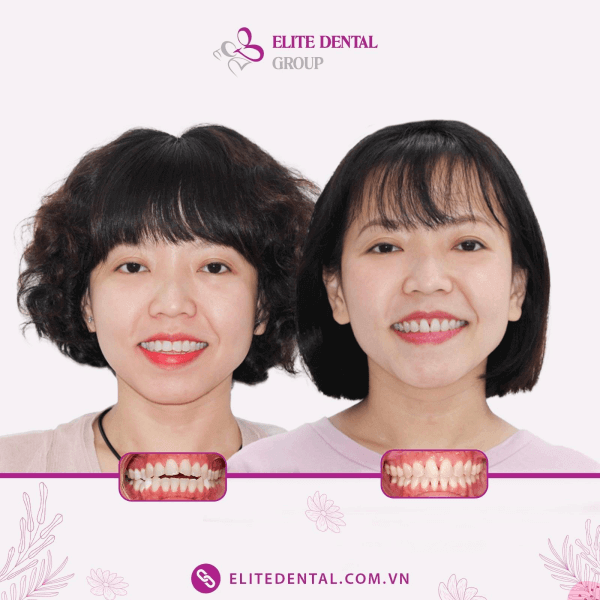
Whether you choose ceramic or metal braces, both have unique pros and cons. Visit Elite Dental for expert consultation and personalized recommendations. Our skilled team is ready to guide you on your journey to a healthier, more confident smile. Contact Elite Dental HERE!
>> Related posts: Comparison of Traditional Braces and Self-Ligating Braces


